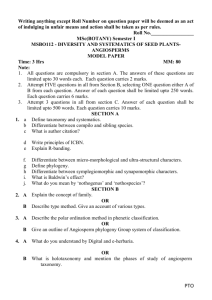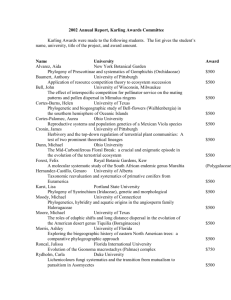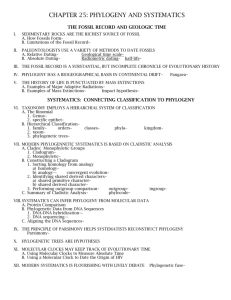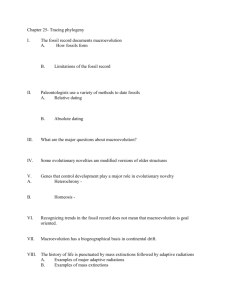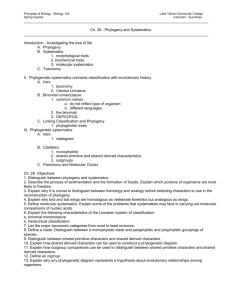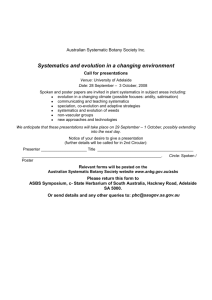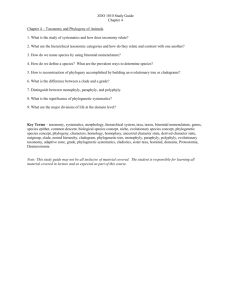Biology 344 - University of San Diego
advertisement
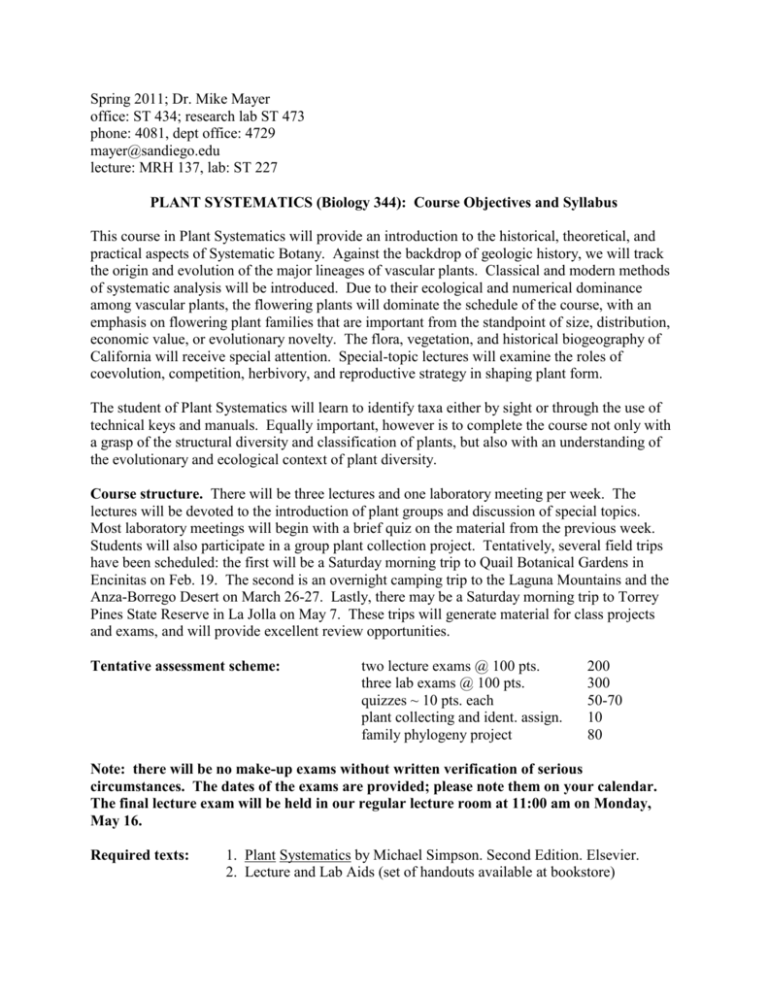
Spring 2011; Dr. Mike Mayer office: ST 434; research lab ST 473 phone: 4081, dept office: 4729 mayer@sandiego.edu lecture: MRH 137, lab: ST 227 PLANT SYSTEMATICS (Biology 344): Course Objectives and Syllabus This course in Plant Systematics will provide an introduction to the historical, theoretical, and practical aspects of Systematic Botany. Against the backdrop of geologic history, we will track the origin and evolution of the major lineages of vascular plants. Classical and modern methods of systematic analysis will be introduced. Due to their ecological and numerical dominance among vascular plants, the flowering plants will dominate the schedule of the course, with an emphasis on flowering plant families that are important from the standpoint of size, distribution, economic value, or evolutionary novelty. The flora, vegetation, and historical biogeography of California will receive special attention. Special-topic lectures will examine the roles of coevolution, competition, herbivory, and reproductive strategy in shaping plant form. The student of Plant Systematics will learn to identify taxa either by sight or through the use of technical keys and manuals. Equally important, however is to complete the course not only with a grasp of the structural diversity and classification of plants, but also with an understanding of the evolutionary and ecological context of plant diversity. Course structure. There will be three lectures and one laboratory meeting per week. The lectures will be devoted to the introduction of plant groups and discussion of special topics. Most laboratory meetings will begin with a brief quiz on the material from the previous week. Students will also participate in a group plant collection project. Tentatively, several field trips have been scheduled: the first will be a Saturday morning trip to Quail Botanical Gardens in Encinitas on Feb. 19. The second is an overnight camping trip to the Laguna Mountains and the Anza-Borrego Desert on March 26-27. Lastly, there may be a Saturday morning trip to Torrey Pines State Reserve in La Jolla on May 7. These trips will generate material for class projects and exams, and will provide excellent review opportunities. Tentative assessment scheme: two lecture exams @ 100 pts. three lab exams @ 100 pts. quizzes ~ 10 pts. each plant collecting and ident. assign. family phylogeny project 200 300 50-70 10 80 Note: there will be no make-up exams without written verification of serious circumstances. The dates of the exams are provided; please note them on your calendar. The final lecture exam will be held in our regular lecture room at 11:00 am on Monday, May 16. Required texts: 1. Plant Systematics by Michael Simpson. Second Edition. Elsevier. 2. Lecture and Lab Aids (set of handouts available at bookstore) Learning outcomes. By the end of this course in Plant Systematics, a student should: --Understand the relationship between plant diversity and plant phylogeny. --Describe the physical structure of plants, both vegetative and reproductive. --Explain how the reconstruction of phylogeny employs hypothesis testing. --Construct a cladogram that can summarize the phylogeny of a group of plants. --Interpret the physical structure of plant in a phylogenetic, historical and ecological context. --Relate the current distribution and dominance of a group of plants with its adaptive history. --Identify plants to a precise taxonomic group. --Understand the significance of plants to world ecology and human civilization. Classroom etiquette. The lecture period is intended to be a focused examination of a topic, and distractions only serve to break this focus and waste everybody’s time. I will come to the lecture prepared to use your time efficiently and maintain this focus. If you choose to come to the lecture, I expect the same courtesy of you. Not surprisingly, the following situations make me grumpy and should be avoided: tardiness (if you miss the beginning, how will you know where we are headed and why we are heading there?), chatting while I am lecturing (distracts me and hurts my feelings), and of course, digital devices: I do not want to see them or hear them. Note: The USD Academic Integrity Policy will be enforced. If you are unclear on what constitutes cheating or plagiarism, please see me (or consult the statement in the Undergraduate Student Handbook or the Undergraduate Bulletin). Group problem-solving is permissible, but this collaboration must be limited to discussions only. The project you turn in must be solely your own work. TENTATIVE SCHEDULE Week starting Lecture topics Laboratory topics Jan 24 Introduction, theory and practice (1*, M1) Intro.; Review of life cycles (M2); Boltaceae classification exercise (15, M6-7, M19-21) Jan 31 History of Systematics; Evolution and phylogeny of plants (3) Vegetative terminology (9) Feb 7 Lycopods and Ferns (4); Gymnosperms (5) Lycopods and Ferns; Keying exercises (M21-22); quiz Feb 14 Gynosperms cont.; Gymnosperms vs. Angiosperms Gymnosperms; quiz (2/19 am - Quail Botanical Gardens) Feb 21 Angiosperms: morphology, evolutionary trends, major groups (6) Lab Exam 1; Gymno. vs. Angiosperms; Monocots vs. Dicots Feb 28 Angiosperm families; Historical biogeography of California Flower, fruit, and inflorescence terminology (9) March 7 Lecture Exam 1 (Wednesday 3/9); Southern California vegetation and community ecology family review and quiz; Collecting and family project intro. (17, 18) March 14 Spring Break (no classes) no laboratory March 21 Angiosperm families; Different methods/philosophies of phylogeny estimation and classification (M15-17) family review and quiz; project (Desert Field Trip: March 26-27) March 28 Angiosperm families; The carnivorous convergence family review and quiz; April 4 Angiosperm families; Polyploidy and speciation (13) Lab Exam 2 (cumulative for taxa) family review; project April 11 Angiosperm families; Economic plants and Native Amer. ethnobotany family review and quiz; project April 18 Angiosperm families; Weed systematics Easter holiday: no Thurs/Friday no laboratory April 25 Angiosperm families; (no Monday lecture) Molecular systematics (14) family review and quiz; project May 2 Angiosperm families (for lecture only); Pollination biology (13) family review and quiz; project (May 7 - Torrey Pines State Reserve) May 9 Last lecture: summary and review Tues: Lab Final (cumulative) Final lecture exam: 11:00 am on Monday, May 16, in MRH 137. *Numbers in parentheses refer to the chapters in the Simpson text where supporting information may be found. The M refers to the lecture and laboratory materials packet.
